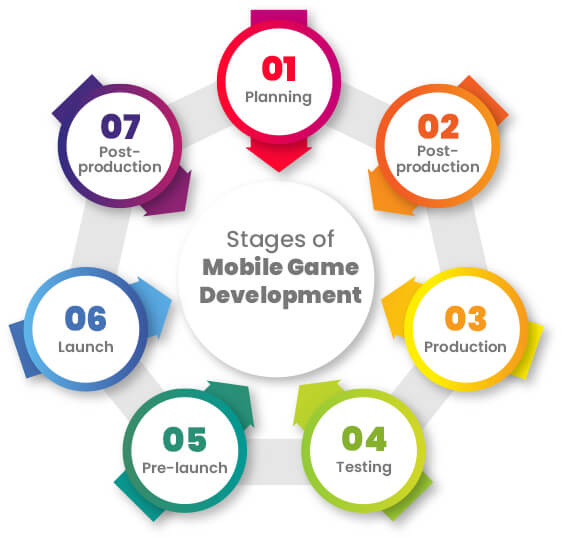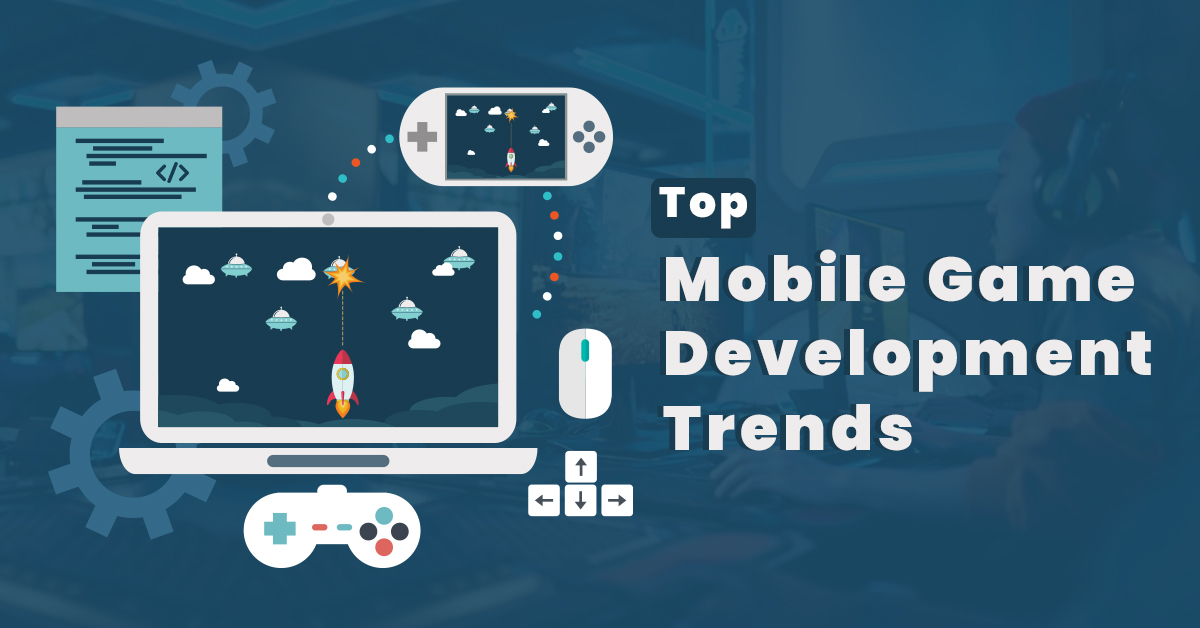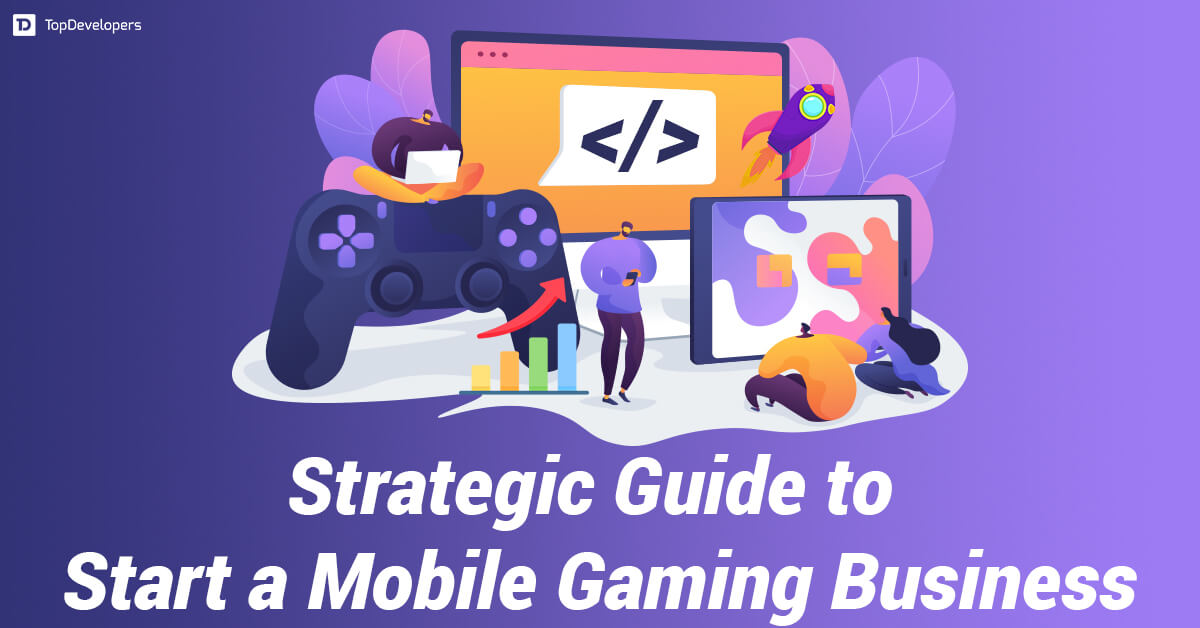
As the demand for immersive and engaging mobile gaming experiences continues to rise, understanding the mobile game development process becomes crucial for aspiring entrepreneurs, game developers, and industry professionals. This short mobile game development guide explores the key steps involved in mobile game development, shedding light on the intricate process that brings these digital wonders to life.
The global gaming market is experiencing unprecedented growth, with projections suggesting that it will reach a staggering $268.8 billion annually by 2025, as reported by Statista. Within this booming industry, mobile game development companies have emerged as key players, creating captivating games that capture the attention of millions of users worldwide.
In 2022, the United States emerged as the largest mobile gaming market globally, accounting for approximately 29% of global mobile player spending. Meanwhile, Japan, which accounted for 30% of the market share in 2015, saw its share decline to 19% of global mobile game expenditure.
Table of Contents
How to Develop a Mobile Game in 7 Steps?
This section explores the mobile game development phases, revealing the key processes and strategies that contribute to creating a successful and engaging gaming experience. From the initial concept to the final launch, budding mobile game developers can gain valuable insights into the game development stages and phases for mobile devices.
Mobile Game Development Planning Stage
During this stage of the mobile game development process, the entire team comes together and engages in brainstorming sessions, generating numerous game ideas. Once a promising idea emerges, thorough research is conducted to ensure its viability. After gaining confidence in the idea’s potential, the team addresses some fundamental questions.
Firstly, they determine the type of mobile game app they are developing, whether it will be in 2D or 3D. Next, they decide on the platform they will target for development. Identifying the target audience and outlining key features that the game will offer are also essential considerations.
Once these basic questions are answered, the team proceeds to plan the mobile game business model, assess technological capabilities, determine the required team size, and select the appropriate game engine. They also establish an estimated budget and timeframe for the entire project and consider monetization strategies to earn money via mobile games.
Your mobile game development team consists of professionals specializing in design, art, and solution architecture. Each specialist contributes their expertise to ensure the best possible outcome, collaborating to reach a consensus and achieve optimal results.
Pre-production phase of Mobile Game Development
During this phase of the mobile game development process, the team focuses on answering critical questions regarding the game, such as its genre, storyline, target audience, and required resources. They also define the game’s rules and descriptions, including mechanics, metagame, and customization design, as well as visual style and graphic requirements.
Furthermore, the mobile game development team addresses important factors like the projected timeline for development, the need for external specialists’ assistance, and the allocation of the budget to accomplish their goals.
During this mobile game development phase, additional ideas are generated based on the initial concept established in the planning phase. A visual guide depicting the overall aesthetics of the mobile game is created. All the essential details determined in the pre-production stage are documented in a mobile game design document, which serves as a reference for the development process. Iterative improvements and updates are made to this document as the mobile game evolves.
A small mobile game prototype is created to test the viability of the core mechanics and ensure they align with the desired gameplay experience. This stage of mobile game development procedure also involves evaluating the game mechanics and refining the art direction.
The duration of the pre-production stage varies depending on the project’s budget, scope, and available resources, typically ranging from one to three months. Once all the necessary preparations are completed, the mobile game development company moves on to the next stage, prepared and equipped to bring the vision to life.
Production Stage of Mobile Game
The production stage is where the mobile game idea takes shape. The art and mobile game designers’ team creates characters, environments, and other necessary assets, while programmers write code to bring the game idea to life. Sound engineers work on music, sound effects, and voiceovers.
Project leads set milestones and assign tasks to ensure proper coordination among departments. This mobile game development stage is challenging and intensive as the team builds the game, focusing on mechanics, pacing, balance, level design, and audio.
The production stage typically consists of several game development phases, allowing for error detection and improvements. The duration of this mobile game development stage varies depending on the team size and the complexity of the game, ranging from months to years.
Mobile Game Testing
Testing is a crucial part of the mobile game development process, closely intertwined with the production stage. After reaching the release candidate stage, detailed testing of the mobile game takes place. The team’s objective is to identify any remaining errors or issues in the game. They assess aspects like character movement and rendering on the screen and gauge player reactions to determine their level of interest and engagement.
Mobile game testing involves various types of tests, sometimes involving unconventional tasks like running into walls or jumping off buildings. Playtesters may also participate in surveys and interviews. The goal is to evaluate the game’s technical aspects and gauge its overall appeal to mobile game players.
Pre-Launch of Mobile Game
The pre-launch stage is a critical and often nerve-wracking time for gaming studios. It raises questions about how the public will receive their first playable version of the mobile game.
Concerns about the game’s appeal, potential bugs, and media coverage can create self-doubt. However, before the formal Beta release, marketing efforts are essential to spread awareness about the game.
Publishers typically expect a captivating hype video showcasing cinematic elements and sample gameplay or game demos to generate interest among game players. Securing a spot at major gaming conventions like E3 or PAX for an exclusive game preview is also common. Participation in these events allows attendees to experience exclusive previews, generating buzz and media coverage. Such exposure at prominent gaming conventions helps build anticipation and positive word-of-mouth prior to the game’s official launch.
Independent mobile game studios with limited marketing budgets explore alternative strategies like crowdfunding and advertising. Sharing early-access Beta copies with influential online gaming personalities for live streaming to their audiences is a popular approach for gaming studios.
Launch of Mobile game
The Launch stage is the final polishing phase of the mobile game development process. After completing testing and fixing any identified errors in a mobile game, the team allocates time for additional enhancements in graphics, audio, and gameplay to achieve the best possible final result.
Gameplay improvements could involve tweaking character movements to feel more responsive and natural, balancing difficulty levels to provide an enjoyable challenge, or introducing new features or mechanics based on feedback from playtesting sessions.
Once all team members are satisfied with the game’s quality and no further improvements are needed, the mobile game is ready for release and distribution.
Post-Production of Mobile Game
The final stage of the process to develop a mobile game is the post-release stage. During this phase, the quality assurance team ensures that the game is of the highest quality and free from bugs. Simultaneously, the game’s marketing efforts continue until its successful release.
This stage is eagerly anticipated by every team member since it marks the end of the long journey toward the game’s goal. After the mobile game is launched and reaches players worldwide, minor bugs or glitches may be discovered. Identifying and fixing these issues is part of the post-release stage.
In this phase of mobile game development process, the team prepares software updates for the game and provides relevant recommendations. For example, players may be advised to use a Virtual Private Network for added security while playing. It is advisable for players to follow such recommendations to protect their sensitive private information.
Ready to build your Mobile Game?
Take action now and confidently navigate through the mobile game development process with the expertise of top mobile game development companies. Embrace creativity, collaborate with talented individuals, and create an engaging gaming experience. With dedication and passion, bring your mobile game idea to life and captivate players worldwide.
FAQs About Mobile Game Development
What is game development process?
Game development process is the set of activities involved in creating a mobile app game, from planning to testing and releasing.
How long does it take to develop a mobile game?
The time to develop a mobile game depends on many factors, such as the complexity, scope, genre, platform, and team size of the game. It can range from a few weeks to a couple of years.
What are the 7 stages of mobile game development?
The 7 stages of mobile game development are: 1) Planning 2) Pre-production 3) Production 4) Testing 5) Pre-launch 6) Launch, and 7) Post-production. Following these steps and their tips shall assure you the best game app development for any platform.
How much does it cost to develop a mobile game?
The cost to develop a mobile game varies depending on the same factors as the time to develop a mobile game. It can range starting from $50000 to $500000.
How do mobile games make money?
Mobile games make money broadly through two methods: in-app purchases and advertising. In-app purchases are when users buy virtual items or currency within the game. Advertising is when users see ads while playing the game or in exchange for rewards or bonuses. It is a kind of giving some space on the game app on rent.
 Avantika Shergil
| Jun 16, 2023
Avantika Shergil
| Jun 16, 2023
Avantika Shergil is a technology enthusiast and thought leader with deep expertise in software development and web technologies. With over 8 years of experience analyzing and evaluating cutting-edge digital solutions, Avantika has a knack for demystifying complex tech trends. Her insights into modern programming frameworks, system architecture, and web innovation have empowered businesses to make informed decisions in the ever-evolving tech landscape. Avantika is passionate about bridging the gap between technology and business strategy, helping businesses build customized software and website, and understand about different tools to leverage effectively for their ventures. Explore her work for a unique perspective on the future of digital innovation.





